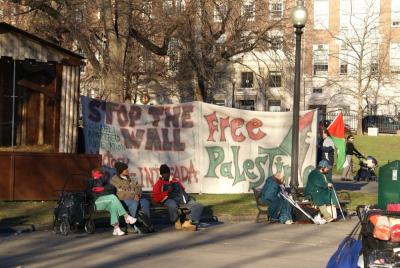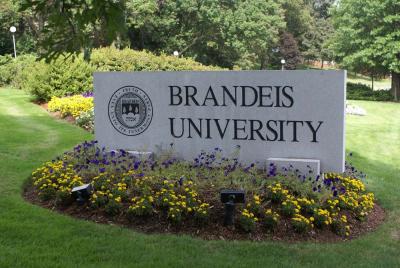Tuesday, 26. December 2006
Brandeis and Carter
Brandeis University has appeared on the pages of “The Boston Globe” due to the planned Jimmy Carter’s visit to campus. In 2002 former U.S. president was awarded the Nobel Peace Prize for his efforts to find peaceful solutions to international conflicts, the most important of which was his role in negotiation of the crisis between Egypt and Israel back in 1970s. And in 2006 J. Carter published a controversial book entitled "Palestine: Peace Not Apartheid" where he critically reflects on Israeli politics in the Middle East. Because of this book chairman of the faculty senate at Brandeis invited J. Carter to speak on campus, however, to make it short, University president Jehuda Reinharz offered a condition that the guest would have to debate with a fiercest critic imaginable - Harvard Law School professor Alan Dershowitz (his op-ed on the issue was published on Harvard website - http://www.law.harvard.edu/news/2006/12/04_dershowitz.php), a suggestion which forced J. Carter to tell “The Boston Globe” a week or so ago that he declined the invitation.

A scandal? A controversy? A University that is supposed to be a space of academic freedom and freedom of expression has shut the doors for an opinion that people who support this institution financially do not like? Yes, to some extent. But also more than that.
Brandeis University was founded by the American Jewish community in 1948, the same year that the state of Israel was counting its first days. It repeats that it is a non-sectarian institution. However… Although, most of the graduate students are not Jewish, a great number, if not the majority, of undergraduates either come from Israel or from the Jewish diaspora in the States. Moreover… Although the University is tolerant of any confessions at least in a sense that anyone can take time off during their religious celebrations, the general academic calendar is adjusted to the Jewish traditions, for example, instead of the Columbus day we have Yom Kippur as a no class day. But the issue is more complex than “the conservative Jewish community is the one to blame” and “The Boston Globe” has been right in pointing to the fractures that have been already proven to exist between the administration and the faculty on campus.

J. Reinharz, the voice and face of the University, at his inaugural address in 1995 said: "Brandeis has a clear and unambiguous identity that rests on four solid pillars: dedication to academic excellence, non sectarianism, a commitment to social action, and continuous sponsorship by the Jewish community." Leaving the issue of social justice and engagement aside as it will need more discussion some time, to many these goals might seem irreconcilable. But the fact of the matter is that Brandeis has been able to balance between academic freedom and financial allegiance to the Jewish diaspora quite successfully. Examples are abundant. Brandeis has a partnership with al-Quds University, which is an Arab institution. And Tony Kushner, who wrote the screenplay for the controversial Steven Spielberg's "Munich", received an honorary doctorate degree at Brandeis last May. Besides, Brandeis has one of the best programs in peace building in the country. However, there are examples of a rather different sort. Last May the exhibition of paintings by Palestinian children and teenagers was removed by a direct order of the president, who is believed to have been pressured by the sponsors. The exhibition went to M.I.T., Brandeis received negative coverage by “The Boston Globe” and the tension still exists between students, faculty members and the administration.
This tension has been enflamed again by the desired by some and unwished by others J. Carter's visit. Faculty members are still trying to convince him to come… they have been collecting donations for that, even though the former president said he would give a speech for free if the organizers could send a plane to take him from Georgia, which is a usual procedure for a figure of a status like his. Furthermore, one professor even suggested recommending the new book about Palestine for all the next year freshmen to read. The students, on their own right, have joined the faculty and the alumni in signing a petition calling for campus officials to bring J. Carter. After all the turmoil started and because of the attention it received from “The Boston Globe”, president J. Reinharz is now claiming that he would still like to see the former president and Nobel Peace Prize winner on campus. However, these are only the words of his spokesperson… And these are only the words so far. The show will go on and Brandeis will either take the open path of its ahead-looking faculty or turn the other way round and so declare challenging ideas and many promising students unwelcome.
Hopefully, to be continued…

A scandal? A controversy? A University that is supposed to be a space of academic freedom and freedom of expression has shut the doors for an opinion that people who support this institution financially do not like? Yes, to some extent. But also more than that.
Brandeis University was founded by the American Jewish community in 1948, the same year that the state of Israel was counting its first days. It repeats that it is a non-sectarian institution. However… Although, most of the graduate students are not Jewish, a great number, if not the majority, of undergraduates either come from Israel or from the Jewish diaspora in the States. Moreover… Although the University is tolerant of any confessions at least in a sense that anyone can take time off during their religious celebrations, the general academic calendar is adjusted to the Jewish traditions, for example, instead of the Columbus day we have Yom Kippur as a no class day. But the issue is more complex than “the conservative Jewish community is the one to blame” and “The Boston Globe” has been right in pointing to the fractures that have been already proven to exist between the administration and the faculty on campus.

J. Reinharz, the voice and face of the University, at his inaugural address in 1995 said: "Brandeis has a clear and unambiguous identity that rests on four solid pillars: dedication to academic excellence, non sectarianism, a commitment to social action, and continuous sponsorship by the Jewish community." Leaving the issue of social justice and engagement aside as it will need more discussion some time, to many these goals might seem irreconcilable. But the fact of the matter is that Brandeis has been able to balance between academic freedom and financial allegiance to the Jewish diaspora quite successfully. Examples are abundant. Brandeis has a partnership with al-Quds University, which is an Arab institution. And Tony Kushner, who wrote the screenplay for the controversial Steven Spielberg's "Munich", received an honorary doctorate degree at Brandeis last May. Besides, Brandeis has one of the best programs in peace building in the country. However, there are examples of a rather different sort. Last May the exhibition of paintings by Palestinian children and teenagers was removed by a direct order of the president, who is believed to have been pressured by the sponsors. The exhibition went to M.I.T., Brandeis received negative coverage by “The Boston Globe” and the tension still exists between students, faculty members and the administration.
This tension has been enflamed again by the desired by some and unwished by others J. Carter's visit. Faculty members are still trying to convince him to come… they have been collecting donations for that, even though the former president said he would give a speech for free if the organizers could send a plane to take him from Georgia, which is a usual procedure for a figure of a status like his. Furthermore, one professor even suggested recommending the new book about Palestine for all the next year freshmen to read. The students, on their own right, have joined the faculty and the alumni in signing a petition calling for campus officials to bring J. Carter. After all the turmoil started and because of the attention it received from “The Boston Globe”, president J. Reinharz is now claiming that he would still like to see the former president and Nobel Peace Prize winner on campus. However, these are only the words of his spokesperson… And these are only the words so far. The show will go on and Brandeis will either take the open path of its ahead-looking faculty or turn the other way round and so declare challenging ideas and many promising students unwelcome.
Hopefully, to be continued…
ieva jusionyte, 11:49h
... comment